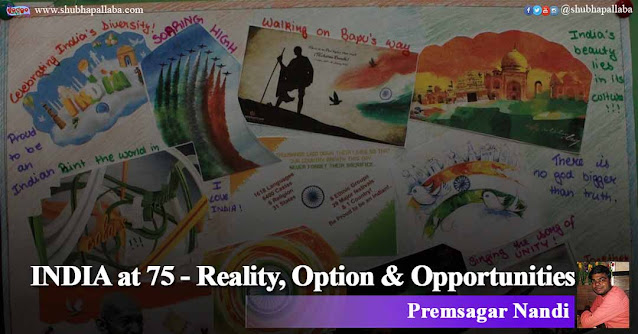INDIA at 75 - Reality, Option & Opportunities
As India celebrates its 75th year of independence, the government has declared to observe “Azadi ki Amrit Mahotsav” in the country to commemorate all such freedom fighters, unsung heroes, and forgotten stars of the Indian freedom struggle who had made supreme sacrifices to free our motherland. Events, achievements, progresses that laid the foundation of modern India are being celebrated with much grandeur to inspire the young generation of the glorious journey that we had till now. The underline theme also could be to make sure all of us know the hardship and sufferings India had in realizing this journey and to prepare the youth for the bigger challenges and opportunities that stares us at the moment.
India has been among a few countries which had shown that democracy can deliver development. Overcoming a bloody partition and subsequent unrest in the country, from deficient to self-sufficient and now being an exporter of wheat and rice, taking a giant step in science and technology, especially Space science to tackling terrorism and extremism, India has been firm in its resolve and made substantial progress in this short period of time. India is now taking leadership in the field of renewable energy, climate change, pharmacology, spirituality, gender justice, environment, and sustainable development. The world and world leaders are looking up to India and its leadership for mitigating some of the complex situation that the world is in. It is satisfying to be in a position where India can contribute to the larger good of the world. And for all that, we can be proud of and grateful to all our leaders, scientists, economists, doctors, army personnel, social reformers, teachers, and to the citizens of this beautiful country.
However, India stands at a crucial juncture where better decisions have to be made in order to protect its larger interest. In this Amrit kal it is only imperative to take stock of the complexity and reality of the fast-evolving world and to weigh our options so that our choices would be better and give us more opportunities that could serve our national interest.
India’s challenges are manifold ranging from political, geo-political, socio-economic, corruption, security of the state, energy and food security, religious fundamentalism, and unemployment to the sanctity of its democratic and constitutional institutions. It’s a now-or-never moment for India.
The first and foremost course correction that India needs is in its internal politics. In the last few years, the level of politics has certainly been degraded. The credibility of both treasury and opposition is fast eroding. Sometimes it’s painful to watch the kind of scenes are going on inside the Indian parliament. Instead of taking into consideration the issues of national interest, the parliament has become a place for the theatrics of petty politics to gain political mileage. Ubiquitous consultation and wisdom are certainly lacking while drafting new rules. As a result, even the better-intended bills are facing stern opposition both inside and outside of the parliament and half-informed stakeholders are being appealed to hit the streets. Had the government been a bit more pragmatic and accommodative in its approach, the Farm & Agnipath protests could have been avoided for greater public welfare. The opposition also needs to introspect instead of opposing for the sake of opposing. In order to counter the government in a real sense and to mobilize public support behind them, they surely have to spell out better and viable alternate policies before the nation rather than just criticism. A steady and peaceful political environment in the country will go a long way to fix some of the fundamental problems that India is facing and all parties should make a concerted effort in that direction.
Corruption, especially institutionalized corruption by politicians & bureaucrats is one of the major hurdles for India not being able to reach the greater heights that it was supposed to. The famous quote of the former Prime Minister Rajiv Gandhi i.e., “If I’m sending 1 rupee from the center, it’s only 15 paisa that is reaching to the last man in the line” sums up the deep-rooted corruption in our system. While the last 7-8 years reported a decline in corruption cases (or maybe not coming to the limelight because of the nexus ), in the last few months we had witnessed bundles of cash, gold, property papers, etc. being seized from prominent politicians of different political parties and high-rank bureaucrats. It certainly brings back to life the ghosts of 2010-11. And the public is in disarray, confused, and helpless. That’s where the investigating and law enforcement agency needs to come forward, be independent and impartial in their approach and process to take the cases into account to their logical conclusion. That will once again restore the public faith in institutions and also strengthen the democracy in our country. And for India’s development, democracy is obligatory rather than an option.
It’s a well-documented fact that we are one of the largest economies in the world and we have done better to reach where we are today. It’s also a reality that in modern times, the economy is what makes a nation’s voice heard. From the inception, strong and large economies manipulate the international forum in their favor. And the flip side is that slow economic growth can lead to massive joblessness and unemployment which in turn creates social unrest and chaos. The recent data suggests that India’s economy is in pretty bad shape with a high unemployment rate and very little job opportunity growth curve. That’s alarming in the sense that India, primarily a consumption-based economy, and if growth and job creation aren’t there, it will be difficult to satisfy the aspiration and demand of its large population. That will lead to severe poverty, hunger, and malnutrition and may also be a precursor to antisocial activities like robbery, murder etc. And seriously, nobody wants that. So course correction is highly needed in this crucial period. Better economic opportunities alone can bring the disenchanted youth back to the track for nation-building.
In all these years India has to deal with two extremely difficult-to-handle neighbors, Pakistan and China on its northern border. The notorious fantasy of Pakistan to conquer Kashmir from India had led to three full-fledged wars and unending proxy wars in the form of infiltration, patronizing terrorists, and creating insurgency in Kashmir. The geographical advantageous positioning of Pakistan had given them the leverage to negotiate with the world and rallying support for its cause in Kashmir. However, this government has done a good job of unmasking the Pakistani agenda on various international platforms and also by striking terror centers deep inside Pakistan. The table has changed and so as the terms of negotiation but still, Pakistan being Pakistan is not changing in its approach. China with a longing expansionist temperament consistently creates trouble on the northeastern border due to its state policy. China’s debt trap policy of capturing neighbors and to use them for its advantage against India is there for everyone to look out. So far, India has managed its neighbors well and maintained a good relationship with its other options in the neighborhood. “Act EAST” policy had played a major role in this. But the time is ticking for us to be more accommodative, innovative, and pragmatic in our approach.
Energy security is a must for nations to prosper and to attain sustainable development. And India heavily depends on traditional fossil fuels for its energy demand. Hence it is naturally dependent on the Middle East countries, USA, Russia and other nations. However, the changing geopolitical and global scenario sometimes making it difficult for India to navigate in the oil and energy market and that’s threatening to some extent. And India is a signatory to the Paris climate convention and to the Glasgow summit where India declared to phase down the use of fossil fuels and achieve “net zero” by 2070. The ambitious target set by India needs to be backed by rapid progress in alternative and renewable energy research and development and heavy capital investment to develop infrastructure. India had started in a positive note by means of the International Solar Alliance and harnessing solar energy, wind energy, etc. but a lot needs to be done. On the other side of development, India has laid clear plans to become a semiconductor giant, and also finding its feet in tapping the rare earth elements potential.
At this Amrit Kal, Communalism, Sectarianism, and religious fundamentalism are threatening the unity, diversity, and sovereignty of this country. India is the land that believes in “वसुधैव कुटुम्बकम्” philosophy and has allowed all faith to grow and live in harmony. It is unpropitious to see the polarization and growing tension between communities leading to riots, violent demonstrations, and religious killings.
Radicalization is the nerve of the problem and some petty politicians and organizations certainly playing their part to keep the pot boiling. Stringent laws, speedy trials, and exemplary punishments could make the difference. And of course, a healing touch sometimes may do a world of good to tone down the extreme emotions. Government, opposition, religious organization and their heads, law enforcing agencies, judiciary, and the public need to work in tandem to see a better and flourishing future of India.
Let this Amrit Kal, be the beginning of something very special that could shape and strengthen India’s progress, and global positioning and guide India to be the natural superpower that it rightfully and deservedly aspires to be.
N.B: The writer claims to be an apolitical observer of national affairs. The views are personal. If anything you can write to premsagarnandi@gmail.com
- PREMSAGAR NANDI




















No comments
Thank you